What Causes Baby Chick to Be Off Balance and Stop Growing
You are here: Home / Cat Facts & Fun / When Do Cats Stop Growing? A Complete Guide To Kitten Growth
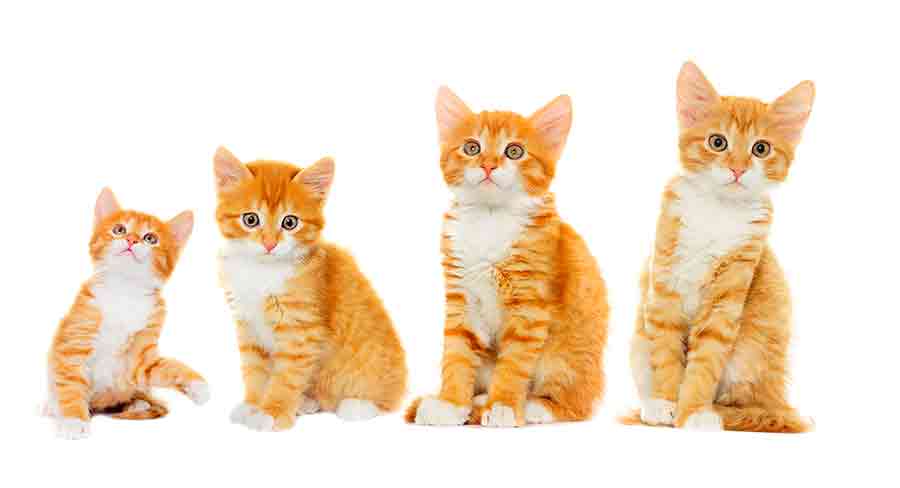
When do cats stop growing? For the majority of breeds, kittens stop growing between 8 and 16 months. But some can take up as long as 5 years to reach their adult size.
But, no matter what their adult size, most of your cat's growth will happen in those first few months.
Your cat's breed can affect the time it takes for them to finish growing. Other factors that affect growth include their gender, overall health, if they are fixed or neutered, and more.
Cat Life Stages
Here are the generally accepted life stages veterinarians use to assess at what age do cats stop growing and cat maturity:
- Birth to 6 months: Kitten life stage, fastest period of growth
- 7 to 24 months: Junior life stage, slower rate of growth
- 3 to 6 years: Prime life stage, larger breeds will still have some growth
- 7 to 10 years: Mature life stage, usually no more growth
- 11 to 14 years: Senior life stage, signs of aging will start to show
- 15+ years: Geriatric life stage, may experience weight loss linked to age-related disorders
Cats will grow most quickly during their kitten life stage, but will continue growing through their junior life stage, and potentially even into their prime years.
Let's take a closer look at how long do cats grow for and how fast.
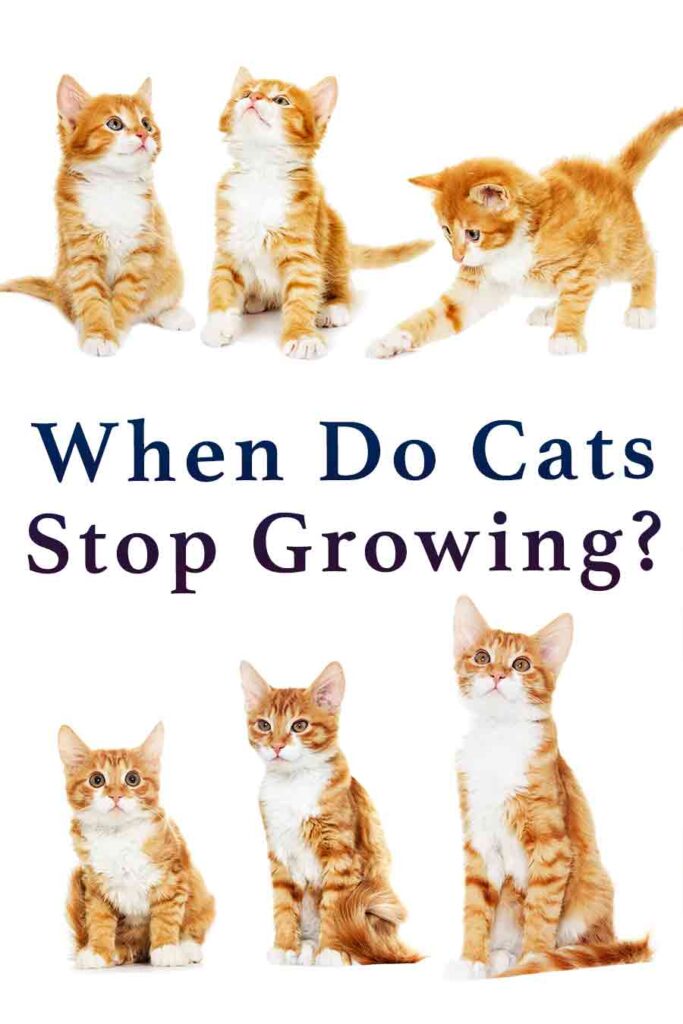
How Fast Do Cats Grow?
One of the reasons we love cats is that there is such a range and variety. But, the downside is that answering the question of how fast kittens grow is much more difficult.
In fact, the question of "how fast do kittens grow?" is one that we must answer on a breed-specific basis.
In other words, if you have a Bengal kitten, the answer to this question will be different than if you have an American Shorthair kitten or a Maine Coon kitten.
And if you have a "mutt" kitten – a kitten whose parentage is unknown or only partially known, then good luck! Figuring out when is a kitten full grown becomes even more of a mystery!
A Few Rules of Thumb
Although it's hard to know exactly how long do cats grow for, there are a few general rules of thumb.
When your kitten is born, she may only weigh a few ounces and will likely fit easily into your palm.
But, every day from then on, she will gain between 0.25 and 0.5 ounces (7 to 14 grams). In other words, she will reach double her birth weight and size between day 10 and day 14.
From here, it is quite normal to see your kitten gain one pound during each of the first 12 months of life. Weight gain for smaller breeds may slow down after reaching 6 to 8 months old.
As you track your individual kitten's growth, it is also vital to write down her starting weight/height/length.
This is because breed, gender, and other factors can influence whether she is at the low or high end of the growth spectrum. These all provide useful markers and milestones for kitten growth.

How Big Will My Cat Get?
A number of factors can influence a cat's weight at each stage of life. These include:
- Gender
- Reproductive status (fixed or intact)
- Birth order
- Number of siblings
- Nursing status (birth mother or human foster parent)
- Health of the parents
- Overall health.
Kitten Growth Chart
As a new kitten parent, you will want to monitor your kitten's overall growth (length, height, weight) from two perspectives. These are healthy kitten growth expectations and breed-specific adult cat growth expectations.
The former is critical to detect any situation where your kitten may fail to thrive. If you are worried that they are growing too slowly, you can seek veterinary care without any delay.
Monitoring growth for health reasons is always a good idea. On the other side of the equation, you won't be surprised when the cat you thought was fully grown just keeps growing and growing!
Growth charts also help you find the answer to the question of when do cats stop growing with reference to your own kitty. While a chart can never be 100% accurate, especially for mixed breed moggies, they still give you a useful reference.
Here are a few benchmarks to watch for:
- 3 month old kitten size: By the age of 3 months (12 weeks), your kitten should weigh between 2 and 4 pounds. They should be three to four times the size they were at birth.
- 4 month old kitten size: By the age of 4 months (16 weeks), your kitten should weigh between 4 and 5 pounds
- 5 month old kitten size: By the age of 5 months (20 weeks), your kitten should weigh between 5 and 6 pounds
- 6 month old kitten size: By the age of 6 months (24 weeks), your kitten should weigh between 6 and 8 pounds.
Neutering and Spaying
If you plan to fix (neuter/spay) your kitten, vets often like to wait until the scale reads at least 4 pounds before scheduling this surgery. It's more difficult to anesthetize smaller cats and there is little room for error.
Neutering should not stunt your cat's growth, but it may alter their metabolic rate, thus affecting their weight.
For many cat breeds, reaching the 6-month milestone will also mean she is between half and three-quarters of the way to her full height and length.
Usually, your cat may continue to gain weight, length, and height well past the one-year mark. Again, that can depend on breed and also the individual cat.
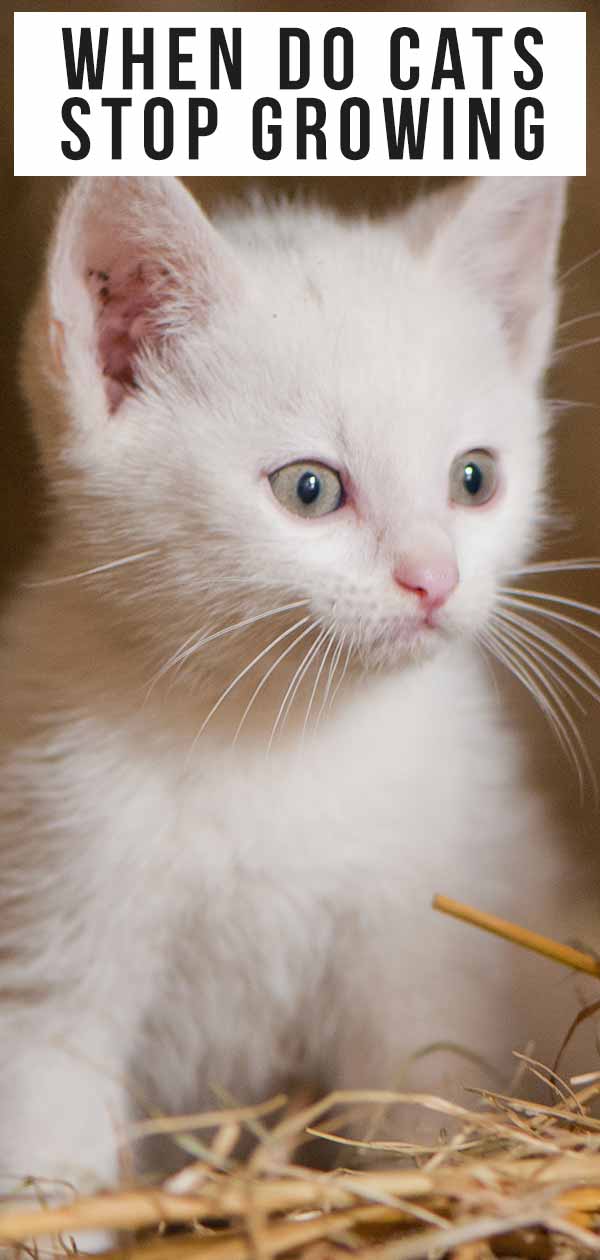
When Do Kittens Stop Growing?
There isn't really any hard and fast scientific evidence to prove at what age do cats stop growing.
Different feline breeds grow at different rates, and some breeds are quite petite at maturity. Others can be surprisingly robust in size and never seem to stop growing.
Most cat breeders agree that kittens stop growing somewhere between 8 and 16 months, depending upon the breed. That's a pretty good rule of thumb for the vast majority of cats.
However, it can be a bit more complicated than that. As we all know, cats are naturally contrary creatures and nothing is that simple!
Milestones to Hit
If you ask a feline veterinarian 'when do cats stop growing', you may get an assessment of your kitten's progress toward adult cat-hood. Usually, vets base these on what they like to call cat "life stages."
However, veterinary science doesn't base these life stages on your cat's length, height, or weight.
Rather, they describe when your kitten is likely to reach other important life milestones.
Milestones include such things as being fully weaned and eating independently. Sometimes, they describe when a cat becomes fertile and able to make kittens. For the youngest cats, it can be achieving the full range of vision and hearing.
How well do you know your cat? Discover the secret world of cats.
The Happy Cat Handbook - A unique guide to understanding and enjoying your cat!

They also include developing a full set of adult cat teeth, alongside behavioral changes such as acquiring important social and predatory skills.
Finally, vets also look at when your kitten completes the cycle of kitten vaccinations and similar benchmarks.
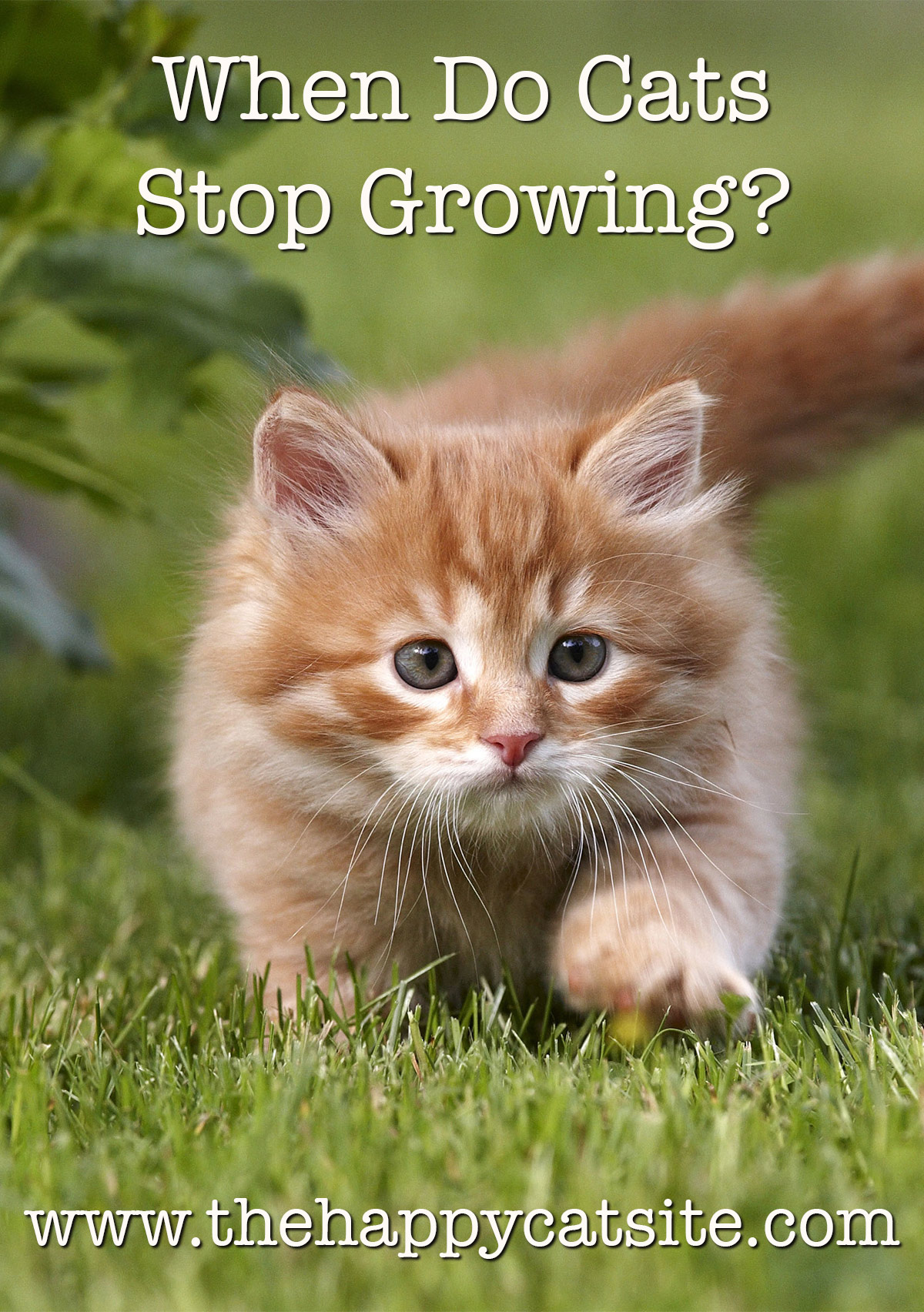
Does Breed Affect Cat Growth
For some breeds, growth towards maturity happens much more slowly or more quickly! We'll learn more about these later. In some cases, your cat may not stop growing until she reaches 18 months.
But, for other breeds, how old are cats when they stop growing may take up to three or even five years.
As we mentioned before, these figures are only guides and cat growth can be very complex!
When Do Tabby Cats Stop Growing?
Tabby cats aren't actually their own breed. The term "tabby" just refers to a type of pattern that cats can inherit.
In fact, a number of different breeds can have tabby patterning. And, each of these will grow at different rates.
If you know your tabby cat's official breed, you should look at stats for these cats to predict how big your kitten will grow.
If not, it may be more of a case of guesswork.
When Do Domestic Shorthair Cats Stop Growing?
Just like tabby cats, domestic shorthair cats don't actually have their own official breed. Domestic shorthairs always have mixed ancestry.
So, once again, their growth rates and adult size can vary from one to the next.
In fact, the only trait that these cats share is their short, manageable fur.
With cats of unknown heritage like this, you may find it easier to refer to our general kitten chart and recognised milestones above.

When Do Big Cat Breeds Stop Growing?
Tabby cats and domestic shorthairs can vary in their adult size. But, what about some other breeds that are known for their large sizes?
When Do Maine Coon Cats Stop Growing?
- Length: Up to 48 inches
- Height: 8 to 16 inches
- Weight: Up to 25 pounds
- Time to full adult size: 4 to 5 years!
Not only is the Maine coon cat the official cat breed for the state of the same name, but it is also officially the largest domestic cat in the world.
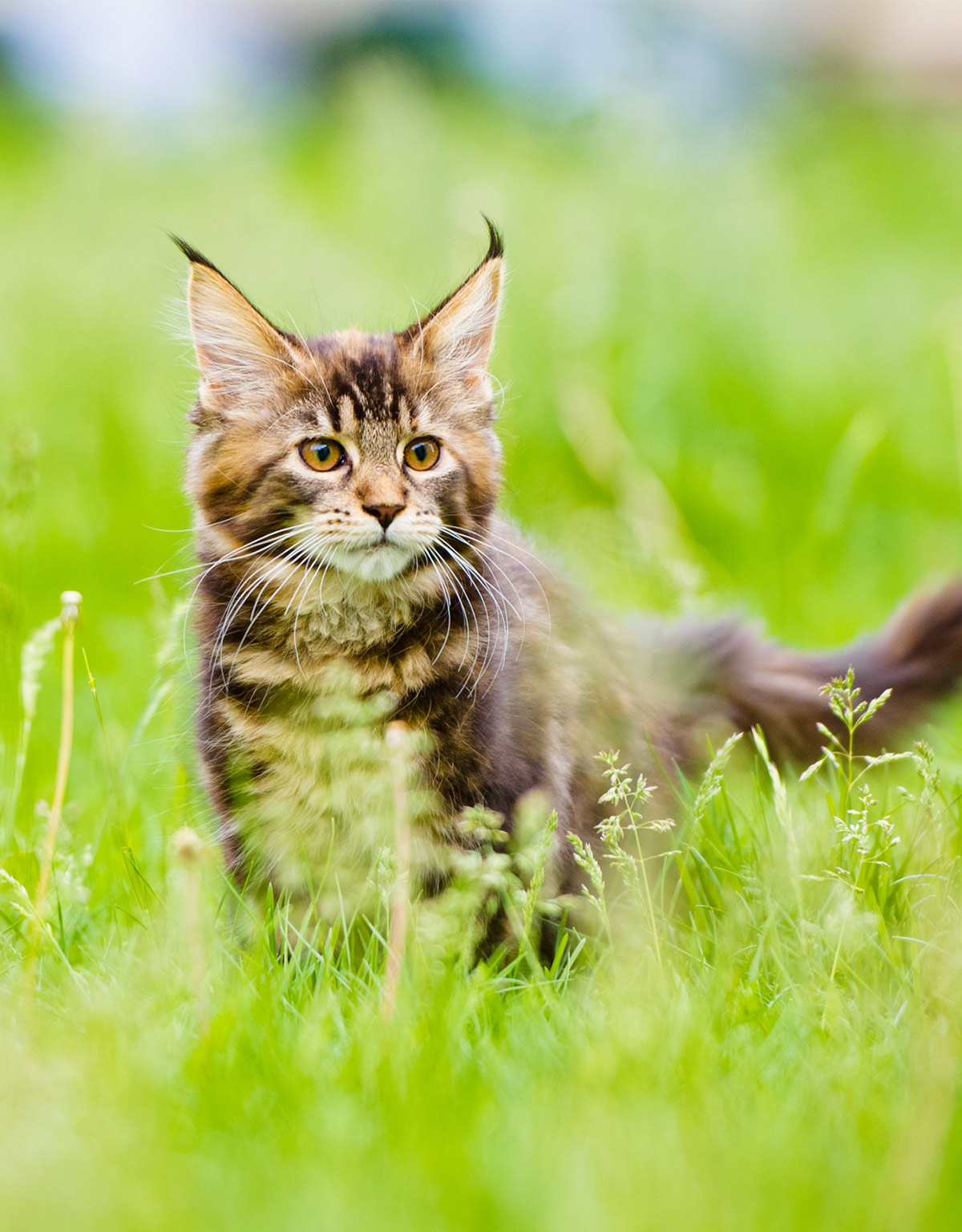
This cat breed currently holds the world record for being the largest cat of any breed – ever!
Stewie, the Maine coon cat was measured at a whopping 48.5 inches long when he won the Guinness Book of World Records title!
So, as you can see, these cats are huge, but they also keep on growing for many years. That kind of puts the idea of cats stopping growing at 18 months to shame.
When Do Bengal Cats Stop Growing?
- Length: 13 to 16 inches
- Height: Up to 11 inches
- Weight: 10 to 22 pounds
- Time to full adult size: Within 1 to 2 years
The cat breed known as the Bengal cat has been described as a "small leopard." Really, this isn't so far from the truth. Don't forget that the original Bengal was a cross between an Asian Leopard cat and a domestic cat of unknown breed!
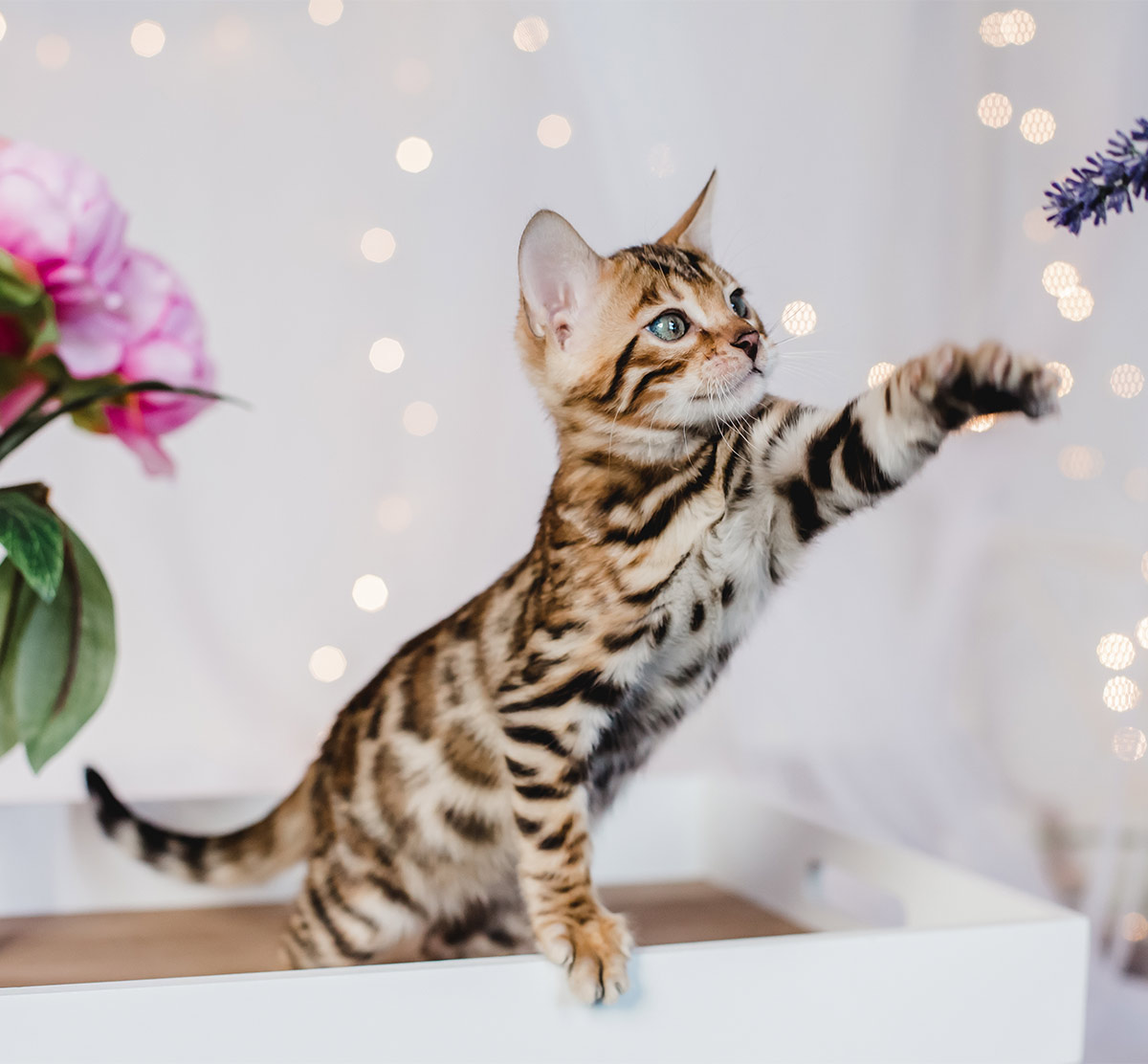
While Bengal cat size can range up to 22 pounds for some males, 16 pounds is more typical.
As with most cat breeds, a full grown male Bengal cat will be slightly heavier than females.
Bengals do tend to stop growing at between 18 months and two years, so they are not as slow to grow as Maine Coons.
Did you know that thousands of research papers have been published on cat behavior and health? No time to read them all? Don't worry - we've done it for you! And picked out the best bits! The Happy Cat Handbook - A unique guide to understanding and enjoying your cat!

When Do Savannah Cats Stop Growing?
- Length: 20 to 25 inches
- Height: 10 to 19 inches
- Weight: 12 to 20 pounds
- Time to full adult size: Within 2 to 3 years.
The gorgeous Savannah cat is actually considered a hybrid breed like the Bengal cat.
Half African serval cat (a wild cat breed), and half domestic cat, these cats have sometimes been described as looking like a "small cheetah." They are certainly beautiful and perhaps the closest you will get to having a wildcat in your home!
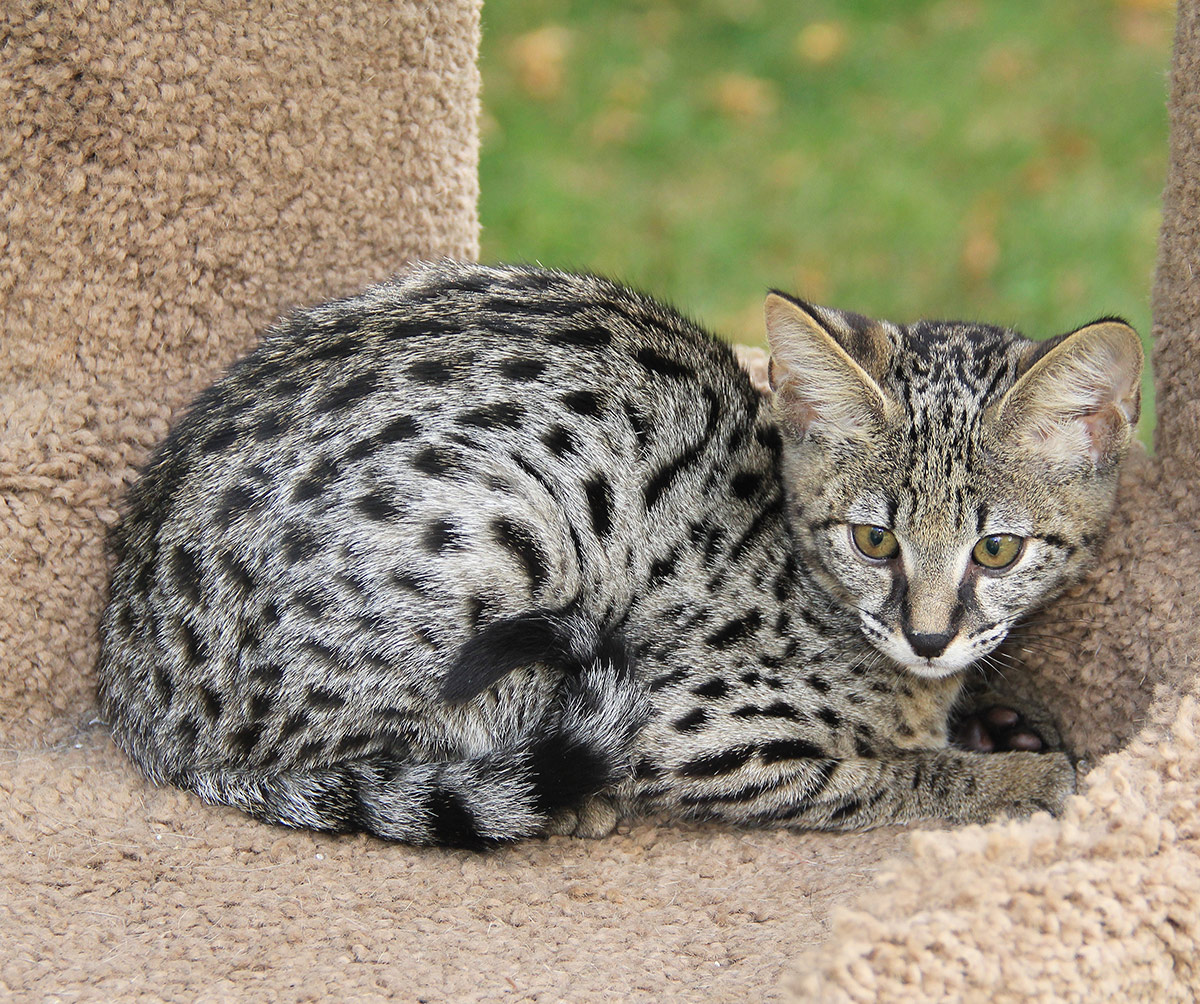
Determining how big do cats get in the Savannah breed depends on whether they are considered to be F1 through F6 class.
Only F1 represents a pairing of an African serval with a domestic cat. They will be larger than all other classes. F2 through F6 represents cats with two Savannah cat parents, and they tend to be smaller and more like their domestic cat lineage in size.
They can be quite slow growing, so don't be surprised if you Savannah has a big growth spurt after his second birthday!
When Do Ragdoll Cats Stop Growing?
- Length: 15 to 26 inches
- Height: 9 to 11 inches
- Weight: 8 to 20 pounds
- Time to full adult size: Up to 4 years
The Ragdoll cat is a fascinating breed for a variety of reasons. Did you know that an estimated 45 percent of this cat's DNA can be directly traced back to a single cat named Raggedy Ann Daddy Warbucks!
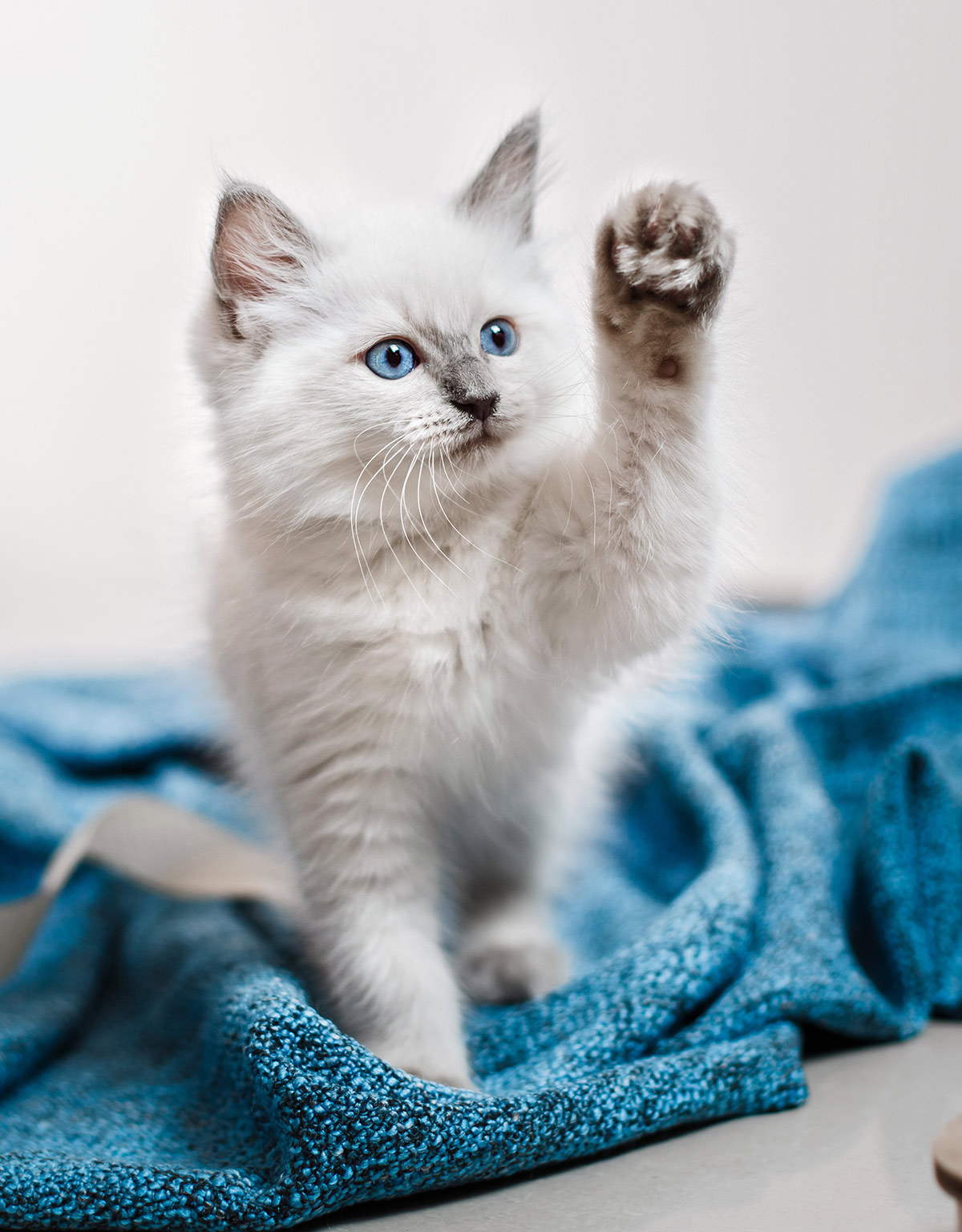
They are another slow growing cat that can just keep getting bigger and bigger, seemingly without end!
When Do British Shorthair Cats Stop Growing?
- Length: 16 to 22 inches
- Height: 14 to 20 inches
- Weight: 7 to 18 pounds
- Time to full adult size: 3 to 5 years!
The British shorthair cat can actually trace its roots all the way back to ancient Egypt. This makes it one of the oldest known cat breeds of all time!
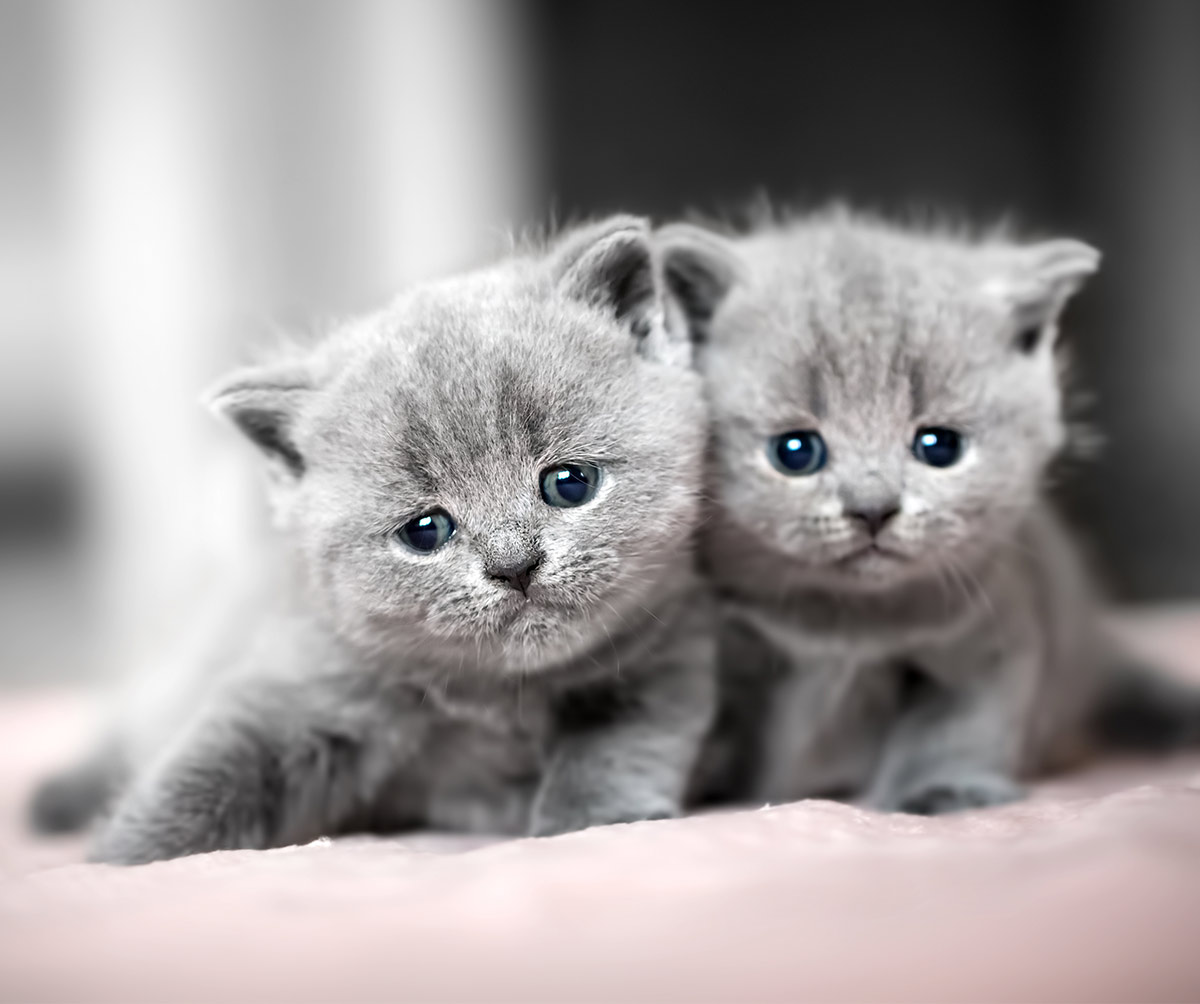
This cat matures quite slowly, but British shorthair cat enthusiasts say the final result is well worth the wait! These stocky cats can surprise owners and seem to keep getting bigger and bigger as they mature.
When Do Overweight Cats Stop Growing?
There are three possible ways to determine where your kitten lies on the breed's kitten growth chart:
- Height: Her full height from paw to shoulder
- Length: Her full length from nose to tail (start or end of tail depending on who is doing the measuring; sometimes the tail length is measured separately)
- Weight: Her full weight along a spectrum at maturity.
Of these three, regardless of whether your kitten is a purebred or a mixed breed cat, weight is the least reliable. You should only use it as a backup source of information.
There is one reason why kitten and cat weight is a poor guide to growth. It's because veterinarians report they are seeing more and more cases of obesity in felines.
Obesity and Overweight Cats
If you're overfeeding your cat, they could be getting bigger without actually growing. So, don't mistake weight gain for health growth.
What if your kitten came to you already overweight? What if he has been consuming more calories than he expends daily in energy? In these cases, her weight might suggest he is closer to reaching his adult cat size than he actually is according to the cat life stages chart!
If you know (or think you know) your kitten's breed, you can use this helpful guide from The Association for Pet Obesity Prevention (APOP). This will help you monitor his weight.
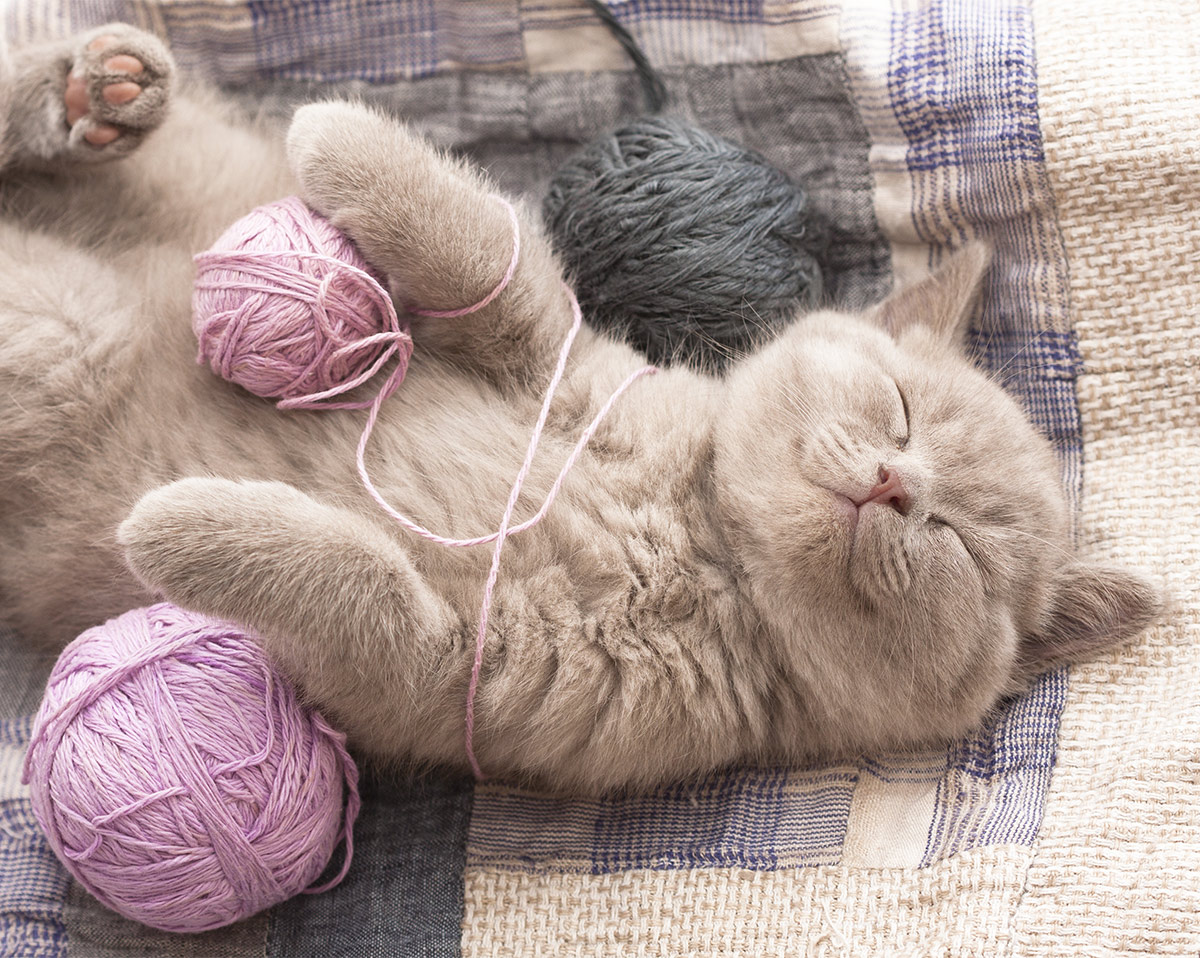
Signs Your Cat is Overweight
It's not always easy to tell when cats are falling outside of their healthy weight, particularly if you don't know their breed.
But, if you've noticed excessive weight gain in your cat, often accompanied by a disinterest in physical activity, your cat may be reaching unhealthy levels of weight.
You should be able to see a slight waistline in your cat when you look at them from above. When you stroke them, you should be able to feel their ribs.
If you're unable to do either of these, or your cat has a low swinging stomach, you should speak to your vet about their weight.
Overweight cats may also have greasy or dirty patches of fur with knots and flaky skin, as they will find it harder to twist and clean themselves like other cats.
Obesity, Health, and Growing
One of the dangers of overweight cats and obesity is that it can be linked to health problems.
And, excess weight can make it harder to tell if your cat is growing at the rate it should be.
The health of your kitten and its parents will affect its growth rates, and its adult size.
Healthier cats from lines of healthy parents will often grow larger than unhealthy kittens.
Work with your vet if you are at all worried about your kitten's health or their risk of inherited health issues.
Does Gender Affect Cat Growth?
As we said earlier, your cat's adult size and weight can also vary depending on their breed.
For instance, in the examples provided here earlier, the adult female cats will tend to stay closer to the low end of the length/height/weight continuum.
Conversely, the adult male cats will tend to hit or even exceed the high ranges for the breed.
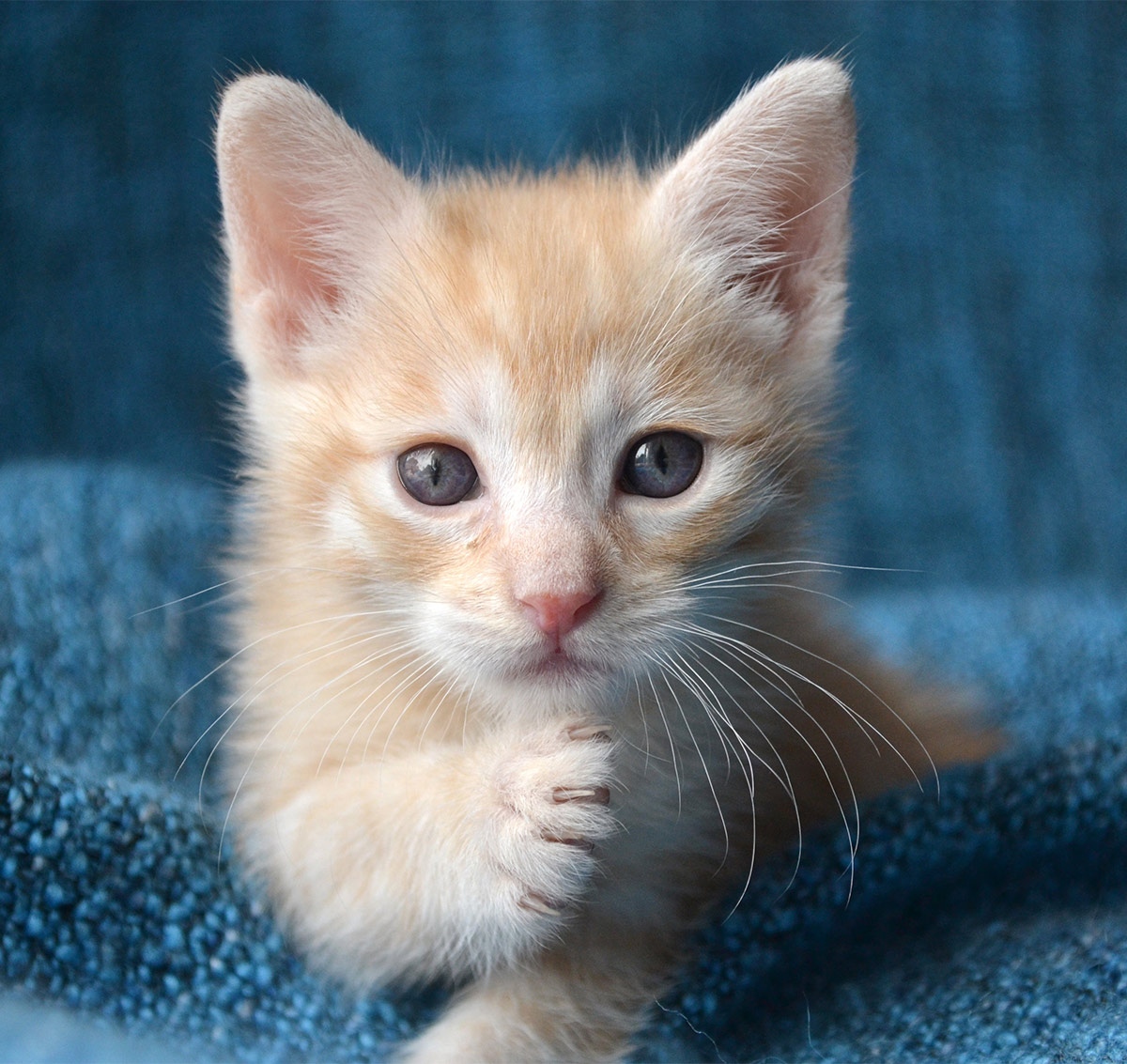
When Do Male Cats Stop Growing?
Male cats will generally take a little longer to reach their full adult size than females of the same breed.
But, other factors will affect their growth. So, male cats belonging to small breeds will usually reach their adult size much faster than males belonging to large breeds.
When Do Female Cats Stop Growing?
Female cats will usually reach their adult size faster than males, because they are usually smaller than males from the same breed.
But, once again, other factors can affect the length of time it takes for different female cats to reach their adult size.

Female Maine Coons will take much longer to grow than female Munchkin cats.
Cats That Don't Grow
If your cat isn't growing and they're older than six months, it could just be that they've already reached their adult size. Particularly if they are a small breed, female, or had any complications with nursing at birth.
If your kitten was reared through nursing with her mom, she may reach her adult size more rapidly.
She may also have a better chance of reaching the larger end of the growth spectrum than if foster human parents cared for her with kitten formula.
Bear in mind that kittens with lots of siblings, or those further down the birthing line, may be smaller.

This is something you may or may not know. It depends on how you acquired your kitten, whether through adoption or from a breeder.
However, if your kitten is under 6 months and is not growing, despite a proper feeding routine, you should speak to your vet.
Measure and record your kitten's height, weight, and length as we mentioned earlier. This will help you see if your cat is definitely not growing, or if it's just a slower process than you realised.
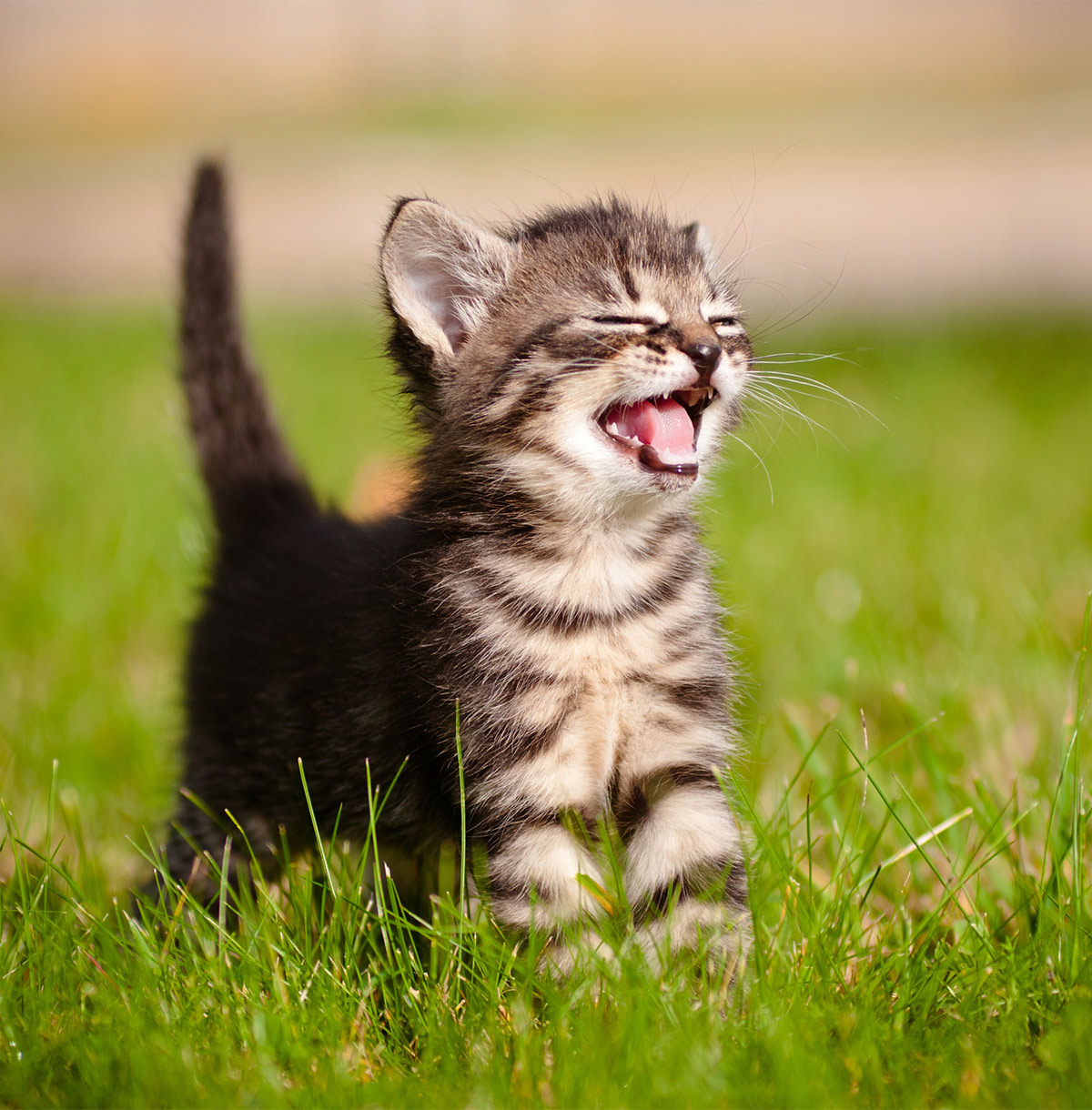
Monitoring Your Kitten's Weight With the Vet
It is always a great idea to bring your new kitten for a veterinarian checkup as soon as possible – if possible, even the same day you bring her home.
This way, you can get a firm benchmark measurement for her health, weight, length, height and overall physical development right from day one.
From there, like many new kitten parents, you may want to keep a growth chart to monitor how her size changes from week to week.
This can help you identify any possible health issues before they become serious. It will also help you really tune in to the small but significant changes she is going through every day.
You may never know the exact day your kitten becomes a cat in terms of her full adult size. But you can feel sure that together, you and your new kitten will enjoy every day of that journey together!
When Do Cats Stop Growing – Summary
So, when do cats stop growing? It's a different journey for every kitten!
Watching your cat grow and develop her own personality as she learns to explore the world is the best part of adopting a cat.
Generally, the larger your cat breed is, the longer it will take them to finish growing. But, work closely with your vet to ensure your kitty stays a healthy weight throughout this process.
References and Resources
- Bukowski, J. (et al) 'Kitten Care', Merck Veterinary Manual (2016)
- Hoyumpa Vogt, A. (et al), '2010 AAFP/AAHA Feline Life Stage Guidelines', American Animal Hospital Association (2010)
- Bateson, P., 'Behavioural Development in the Cat', The Domestic Cat: The Biology of its Behaviour/Cambridge University Press (2000)
- Zoran, D. L. 'Feeding Cats and Feline Obesity', DVM360 (CVC in Kansas City Proceedings), (2009)
- Remillard, R. L. (et al) 'Comparison of Kittens Fed Queen's Milk With Those Fed Milk Replacers', American Journal of Veterinary Research (1993)
- Pet Obesity Prevention
- Olson, P. (et al), 'Early-Age Neutering of Dogs and Cats in the United States (A Review)', Journal of Reproduction and Fertility (2001)
Your Amazing Cat!

We are so excited to share our new book with you!
If you have enjoyed your visit to The Happy Cat Site we think you'll love The Happy Cat Handbook.
Written by the founders of this website including the author of the hugely successful Happy Puppy Handbook, it's packed with cat care information and fascinating cat facts.
Grab your copy today!
Free Updates For Cat Lovers!
Our cat care articles, tips and fun facts, delivered to your inbox

What Causes Baby Chick to Be Off Balance and Stop Growing
Source: https://www.thehappycatsite.com/when-do-cats-stop-growing/
0 Response to "What Causes Baby Chick to Be Off Balance and Stop Growing"
Post a Comment